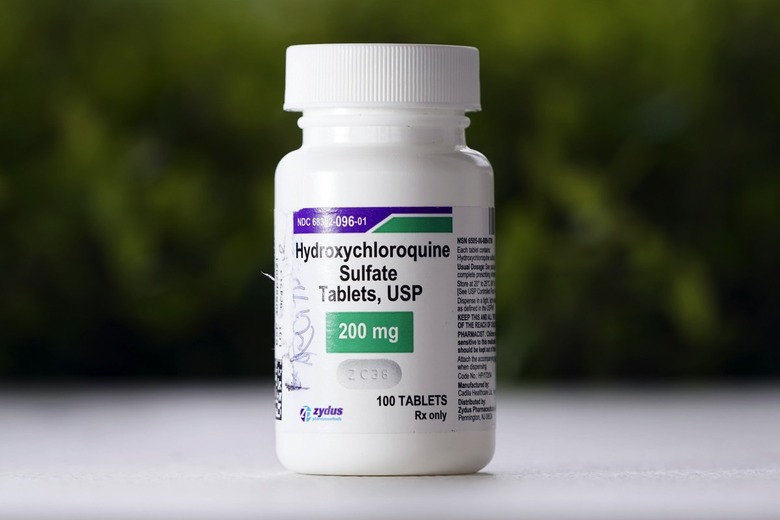The CDC Just Changed Key Info About Hydroxychloroquine On Its Coronavirus Site
- The CDC corrected a page on its website that detailed therapeutic options for the novel coronavirus disease.
- A previous version included the actual dosage of the controversial hydroxychloroquine drug for COVID-19 patients, information that was based on anecdotal evidence rather than peer-reviewed studies.
- As popular as the drug might be on TV right now, there's no reliable scientific evidence that it can hasten the recovery from COVID-19 or prevent a coronavirus infection.
- Visit BGR's homepage for more stories.
You've heard about chloroquine and hydroxychloroquine everywhere by now, and it's all thanks to the novel coronavirus pandemic that's shutting down countries around the world. The drug is just one of the various possible COVID-19 therapies that are in testing right now, but it's so popular for one reason: President Trump parrotted a report he saw on the news that it could be a game-changer and that it can help us get rid of the illness.
The sad reality is that we've hardly reached a point where the science can back any of that up. There are limited studies that say anti-malarial drugs can help ameliorate the overall state of some patients. And there are equally limited studies that say it won't make a difference. Then there's anecdotal evidence from patients who think they've survived COVID-19 because of chloroquine therapy, just as there's anecdotal evidence that hydroxychloroquine can poison people who misuse the drug. And one person died because he took something that sounded like the miracle cure being talked about on TV.
Health experts keep warning us that hydroxychloroquine isn't the miracle drug you're looking for because the science doesn't back up that idea. But even so, the Centers for Disease Control and Prevention (CDC) published unusual guidance about the drug on its official coronavirus pages, which can easily be labeled as misinformation. Thankfully, the CDC has now fixed the error.
The Food and Drug Administration (FDA) authorized the use of chloroquine a few days ago, which makes sense given that the World Health Organization (WHO) has included the drug in a mega-trial meant to hasten the discovery of effective COVID-19 therapies. But the CDC posted dosing information for the drug on its website a few days ago, attributing them to anecdotal evidence, not peer-reviewed studies.
"Although optimal dosing and duration of hydroxychloroquine for treatment of COVID-19 are unknown, some U.S. clinicians have reported anecdotally" on ways to prescribe the medication, said the CDC page, via Reuters. The chairman of the National Advisory Commission on Rural Health, Dr. Jeffrey Colyer, penned an unusual op-ed post in The Wall Street Journal last week where he explicitly cited dosage for the drug.
That's definitely not the kind of information you want to have available, as some people will try to treat themselves based on information in op-eds or on CDC pages.
Some professionals were quick to observe the unusual language CDC used to describe hydroxychloroquine use in COVID-19 cases. "Why would CDC be publishing anecdotes?" dean of the Milken Institute School of Public Health at George Washington University asked Reuters. "That doesn't make sense. This is very unusual."
Mayo Clinic cardiologist and director of Windland Smith Rice Genetic Heart Rhythm Clinic Dr. Michael Ackerman warned in guidance for fellow physicians about the heart-related side-effects of the drug, which can lead to sudden death. "What disturbed me the most was when I was seeing not political officials say these medications are safe but seeing on the news cardiologists and infectious disease specialists say [hydroxichloroquine] is completely safe without even mentioning this rare side effect," Ackerman told NBC News.
A few days ago, infectious disease expert Dr. Anthony Fauci attempted to explain to Fox & Friends anchors who kept pushing the anti-malarial's supposed benefits in COVID-19 cases. "But getting back to what you said just a moment ago that 'X percent' — I think you said 37 percent — of doctors feel that it's beneficial. We don't operate on how you feel. We operate on what evidence is, and data is," he said. "So although there is some suggestion with the study that was just mentioned by Dr. Oz—granted that there is a suggestion that there is a benefit there — I think we've got to be careful that we don't make that majestic leap to assume that this is a knockout drug."
The CDC now removed that specific hydroxychloroquine information from its website. "There are no drugs or other therapeutics approved by the US Food and Drug Administration to prevent or treat COVID-19," the page reads. As for the controversial drug, the updated page reads, "hydroxychloroquine and chloroquine are under investigation in clinical trials." The CDC also removed information about Remdesivir from the page, another drug that's being tested for COVID-19 treatment. However, the Remdesivir references did not include dosage instructions.
You can access the most recent version of the page, which lists other potential drugs being studied for use in COVID-19 treatment, at this link.
